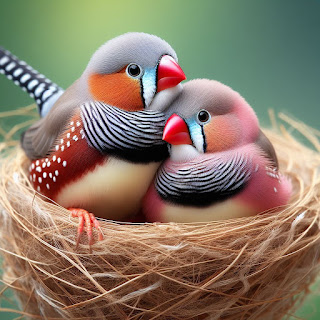Zebra Finch: The Art of Whistle Training.
Trust and Connection: Taming Your Zebra Finch with Personalized Whistles and Gentle Seeds 🎶🐦
Building a Lifelong Bond: Nurturing Trust and Friendship with Your Zebra Finch Through Music and Positive Reinforcement 🐦💖
Bird Whistle Taming: Step-by-Step Guide to Establishing Trust and Communication with Your Feathered Companion 🥰🎶🐦
Feathered Friends 101: A Guide for Pet Lovers – How to Tame Your Zebra Finch with Love and Care 🐦💕
 |
| Tame Zebra Finch |
Feathered Companionship: Nurturing Trust and Connection with Your Avian Ally for a Lifelong Bond of Friendship 🐦💖
It's all about building a bond of trust with your feathered friend! 🥰🎶🐦 Let me guide you through the process of taming your bird to perch on your hand, step by step. 🐦
First and foremost, it's crucial to maintain a positive atmosphere by moving slowly and minimizing any negative sounds. ❤️🐦
Whistling short tunes with Your Feathered Friend, Birds Pop Music 🎶🦜
Instead of talking to your Zebra finches, try whistling a gentle tune, like the ones you hear in bird pop music. 🤓😂. 😙 I personally use a collection of short and simple whistles 😙 to re-educate the birds. Over time, they will become familiar with a variety of tunes, creating a cause-and-effect relationship. Once they understand the meaning behind a specific whistle, they will respond accordingly. For instance, I whistle 😙 a door-opening tune whenever I open their birdcage door 🚪. As a result, they associate the sound with the door opening. 😁 This way, they know what to expect and there are no surprises. In my case, whenever I whistle, my Zebra finches fly to their favorite coconut swing/perch. I believe they chose this spot because it offers them a panoramic 180-degree view.
When it comes to using human words, it's best to avoid it as it can make Finches uncomfortable. They are not accustomed to listening to human language, so it's better to communicate with them in their own unique way.
 |
| Train The Well |
Introducing Delightful Foods to Your Feathered Friend for a Healthy Bond 🌽🦜
Preparing your bird to accept the foods being offered can be an exciting process! Now, let's move on to the next step. We want to introduce new items that will eventually be placed inside the birdcage. One example is wild grass that's seeding. You can hang it near their coconut swing or perch, so they can see it through the bird wire. It's important to pay attention to your bird's reaction and learn their body and feather language.
Once you notice that your birds are getting excited, it's time to take the next step. Start by whistling a happy tune while opening the door of the cage. Then, slowly push the grass into the birdcage. However, if you see that your birds are stressed, it's important to be patient. Don't rush them, as birds need time to understand what's happening.
Nurturing Understanding, let them move at their Own Pace 🕊️⌛
If your birds start flapping too much, you can try placing the grass against the cage. This way, when they're ready, they can nibble on the grass through the bird cage. Once they become familiar with the grass, you can try placing it inside the cage using the same approach.
These activities will help tame your bird and build trust. Your birds will learn how to receive treats from you and feel safe in the process. When you see them happily nibbling on the grass seeds, why not whistle a new happy melody? It's a great way to celebrate their progress! Once your birds are completely comfortable with receiving grass seeds in this manner, it's time to move on to the next stage.
Now is the perfect time to showcase your steady and calm hand while handling grass seeds on your open palm. Start by presenting your relaxed hand to the birds outside their cage. Take note of their reaction. Are they paying attention and displaying signs of hunger? The key question is, do they move closer to the meshing to get a better look at the seeds? If the answer is yes, then that's fantastic news! Now, let's move on to the next step. Just like with the grass instructions, repeat the process with your hand.
Extending a Hand of Friendship with Seeds in Harmony 🎶🤝
Whistle your special "door opening" melody and slowly extend your hand with the seeds. Keep a close eye on your bird's reaction. Remember, many birds are wary of being handled, as they may have had negative experiences in pet shops. So, it's expected that they will be cautious. Patience is key here, so wait and observe if they approach your hand. If they do, congratulations! You are successfully taming your bird. Don't forget to whistle during the process, as it helps your bird understand what to expect. It may take around 3 or 4 days, but who knows, maybe you have a natural talent for bird whispering and whistling! Before you know it, your bird will be happily eating out of your hand.
👌
#zebrafinch #zebrafinchtaming



